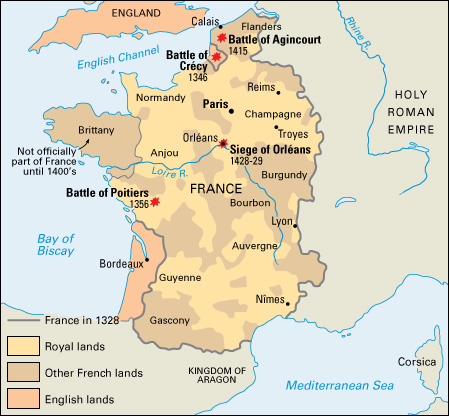Hundred Years’ War (1337-1453) extended over the reigns of five English and five French kings who fought for control of France. This struggle between England and France actually consisted of a succession of wars broken by truces and treaties. The war had several contributing causes. Efforts of the French kings to control the English-held province of Guyenne in southwest France angered the English. The French supported the Scots against England, and the French attempted to control Flanders and the English wool trade there. English and French sailors and fishermen quarreled over rights in the English Channel.
The war began in 1337. That year, King Philip VI of France declared he would take over Guyenne, and King Edward III of England, whose mother was the sister of three French kings, claimed the French throne.
In the fighting that followed, the English won most of the battles. But the French won the war. English resources were about a third as great as those of the French. Several events hindered the course of the war. These events included peasant rebellions; pillaging in France by unemployed soldiers; outbreaks of plague, now known as the Black Death, which struck both countries; and a peasants’ revolt in England in 1381. The war weakened the powers of the nobility and strengthened centralized government in both countries. The war also marked the rise of French unity, the development of new military tactics, and the growth of English sea power.

English archers and infantry won the war’s greatest victory in the Battle of Crécy (1346). The English also won the Battle of Poitiers (1356). The Treaty of Bretigny in 1360 began a brief period of peace. But Henry V of England renewed the fighting and emerged triumphant at the Battle of Agincourt (1415). The Treaty of Troyes in 1420 made Henry V heir to the French crown.
After Henry V died in 1422, the French disputed the English claim to the throne, and war flared. By 1428, the English had swept through northern France and laid siege to Orleans. Joan of Arc led a French army and ended the siege in 1429. She became a prisoner of the English, who later burned her to death. The French continued to win battles. By 1453, England had lost all its territory on the continent of Europe, except Calais. The French took Calais in 1558.
